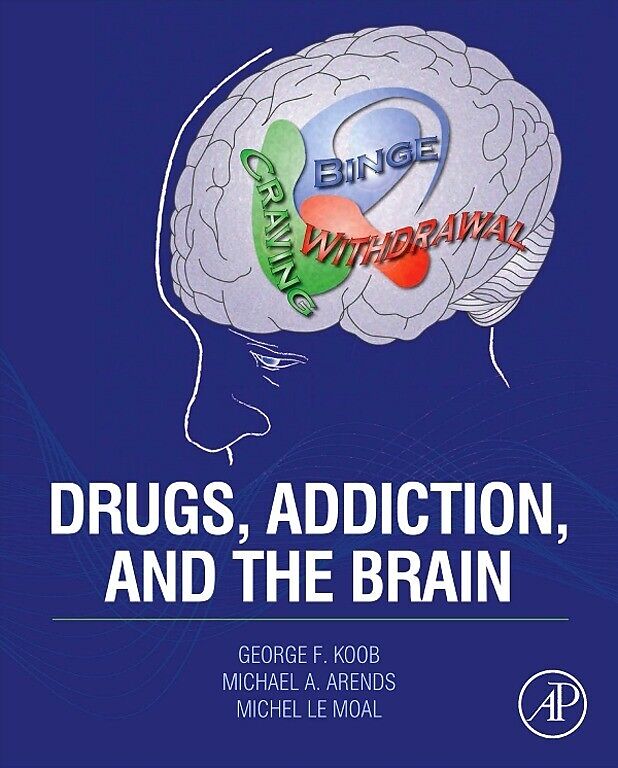Drugs, Addiction, and the Brain
Format:
E-Book (EPUB)
EAN:
9780123869593
Genre:
Medizin
Autor:
George F. Koob, Michael A. Arends, Michel Le Moal
Herausgeber:
Elsevier Reference Monographs
Anzahl Seiten:
350
Erscheinungsdatum:
12.07.2014
Drugs, Addiction, and the Brain explores the molecular, cellular, and neurocircuitry systems in the brain that are responsible for drug addiction. Common neurobiological elements are emphasized that provide novel insights into how the brain mediates the acute rewarding effects of drugs of abuse and how it changes during the transition from initial drug use to compulsive drug use and addiction. The book provides a detailed overview of the pathophysiology of the disease. The information provided will be useful for neuroscientists in the field of addiction, drug abuse treatment providers, and undergraduate and postgraduate students who are interested in learning the diverse effects of drugs of abuse on the brain.
Full-color circuitry diagrams of brain regions implicated in each stage of the addiction cycle
Actual data figures from original sources illustrating key concepts and findings
Introduction to basic neuropharmacology terms and concepts
Introduction to numerous animal models used to study diverse aspects of drug use.
Thorough review of extant work on the neurobiology of addiction
George F. Koob, Ph.D., received his Bachelor of Science degree from Pennsylvania State University and his Ph.D. in Behavioral Physiology from The Johns Hopkins University. He was recently appointed (in 2014) as Director of the National Institute on Alcohol Abuse and Alcoholism (currently on a leave of absence as Professor at The Scripps Research Institute, Adjunct Professor in the Departments of Psychology and Psychiatry at the University of California San Diego, and Adjunct Professor in the Skaggs School of Pharmacy and Pharmaceutical Sciences at the University of California San Diego). As an authority on drug addiction and stress, he has contributed to our understanding of the neurocircuitry associated with the acute reinforcing effects of drugs of abuse and the neuroadaptations of the reward and stress circuits associated with the transition to dependence. Dr. Koob has published over 780 scientific papers. In collaboration with Dr. Michel Le Moal, he wrote the renowned book Neurobiology of Addiction (Elsevier, 2006). He was previously Director of the NIAAA Alcohol Research Center at The Scripps Research Institute, Consortium Coordinator for NIAAA's multi-center Integrative Neuroscience Initiative on Alcoholism, and Co-Director of the Pearson Center for Alcoholism and Addiction Research. He has trained 75 postdoctoral fellows and 11 predoctoral fellows. He is currently Editor-in-Chief of the journal Pharmacology Biochemistry and Behavior and Senior Editor for Journal of Addiction Medicine. Dr. Koob taught for 35 years in the Psychology Department at the University of California San Diego, including courses such as Drugs Addiction and Mental Disorders and Impulse Control Disorders, courses that regularly matriculated 400-500 students each. He also taught Contemporary Topics in Central Nervous System Pharmacology at the Skaggs School of Pharmacy and Pharmaceutical Sciences at UCSD for 9 years.
Dr. Koob's research interests have been directed at the neurobiology of emotion, with a focus on the theoretical constructs of reward and stress. He has made contributions to our understanding of the anatomical connections of the emotional systems and the neurochemistry of emotional function. Dr. Koob has identified afferent and efferent connections of the basal forebrain (extended amygdala) in the region of the nucleus accumbens, bed nucleus of the stria terminalis, and central nucleus of the amygdala in motor activation, reinforcement mechanisms, behavioral responses to stress, drug self-administration, and the neuroadaptation associated with drug dependence.
Dr. Koob also is one of the world's authorities on the neurobiology of drug addiction. He has contributed to our understanding of the neurocircuitry associated with the acute reinforcing effects of drugs of abuse and more recently on the neuroadaptations of these reward circuits associate
Drugs, Addiction, and the Brain explores the molecular, cellular, and neurocircuitry systems in the brain that are responsible for drug addiction. Common neurobiological elements are emphasized that provide novel insights into how the brain mediates the acute rewarding effects of drugs of abuse and how it changes during the transition from initial drug use to compulsive drug use and addiction. The book provides a detailed overview of the pathophysiology of the disease. The information provided will be useful for neuroscientists in the field of addiction, drug abuse treatment providers, and undergraduate and postgraduate students who are interested in learning the diverse effects of drugs of abuse on the brain.Full-color circuitry diagrams of brain regions implicated in each stage of the addiction cycleActual data figures from original sources illustrating key concepts and findingsIntroduction to basic neuropharmacology terms and conceptsIntroduction to numerous animal models used to study diverse aspects of drug use.Thorough review of extant work on the neurobiology of addiction
Autorentext
George F. Koob, Ph.D., received his Bachelor of Science degree from Pennsylvania State University and his Ph.D. in Behavioral Physiology from The Johns Hopkins University. He was recently appointed (in 2014) as Director of the National Institute on Alcohol Abuse and Alcoholism (currently on a leave of absence as Professor at The Scripps Research Institute, Adjunct Professor in the Departments of Psychology and Psychiatry at the University of California San Diego, and Adjunct Professor in the Skaggs School of Pharmacy and Pharmaceutical Sciences at the University of California San Diego). As an authority on drug addiction and stress, he has contributed to our understanding of the neurocircuitry associated with the acute reinforcing effects of drugs of abuse and the neuroadaptations of the reward and stress circuits associated with the transition to dependence. Dr. Koob has published over 780 scientific papers. In collaboration with Dr. Michel Le Moal, he wrote the renowned book Neurobiology of Addiction (Elsevier, 2006). He was previously Director of the NIAAA Alcohol Research Center at The Scripps Research Institute, Consortium Coordinator for NIAAA's multi-center Integrative Neuroscience Initiative on Alcoholism, and Co-Director of the Pearson Center for Alcoholism and Addiction Research. He has trained 75 postdoctoral fellows and 11 predoctoral fellows. He is currently Editor-in-Chief of the journal Pharmacology Biochemistry and Behavior and Senior Editor for Journal of Addiction Medicine. Dr. Koob taught for 35 years in the Psychology Department at the University of California San Diego, including courses such as Drugs Addiction and Mental Disorders and Impulse Control Disorders, courses that regularly matriculated 400-500 students each. He also taught Contemporary Topics in Central Nervous System Pharmacology at the Skaggs School of Pharmacy and Pharmaceutical Sciences at UCSD for 9 years. Dr. Koob's research interests have been directed at the neurobiology of emotion, with a focus on the theoretical constructs of reward and stress. He has made contributions to our understanding of the anatomical connections of the emotional systems and the neurochemistry of emotional function. Dr. Koob has identified afferent and efferent connections of the basal forebrain (extended amygdala) in the region of the nucleus accumbens, bed nucleus of the stria terminalis, and central nucleus of the amygdala in motor activation, reinforcement mechanisms, behavioral responses to stress, drug self-administration, and the neuroadaptation associated with drug dependence. Dr. Koob also is one of the world's authorities on the neurobiology of drug addiction. He has contributed to our …

Leider konnten wir für diesen Artikel keine Preise ermitteln ...
billigbuch.ch sucht jetzt für Sie die besten Angebote ...
Die aktuellen Verkaufspreise von 3 Onlineshops werden in Realtime abgefragt.
Sie können das gewünschte Produkt anschliessend direkt beim Anbieter Ihrer Wahl bestellen.
Loading...
Die aktuellen Verkaufspreise von 3 Onlineshops werden in Realtime abgefragt.
Sie können das gewünschte Produkt anschliessend direkt beim Anbieter Ihrer Wahl bestellen.
| # | Onlineshop | Preis CHF | Versand CHF | Total CHF | ||
|---|---|---|---|---|---|---|
| 1 | Seller | 0.00 | 0.00 | 0.00 |
